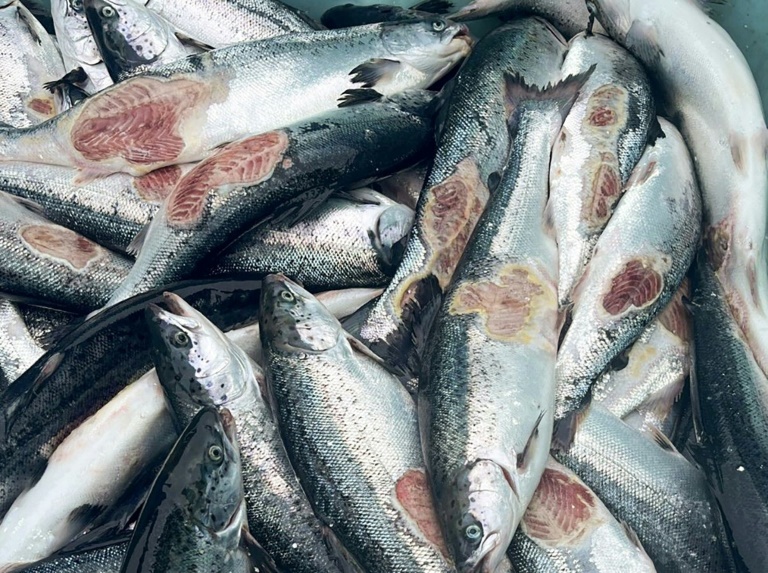Science
Pharmaceutical Pollution Threatens Salmon Migration in Sweden

Pharmaceutical pollution poses a significant threat to the migration patterns of salmon, according to new research from Sweden. The study highlights the impact of pharmaceutical waste, specifically the presence of clobazam, a medication commonly prescribed for sleep disorders, on the river-to-sea migration success of juvenile Atlantic salmon (Salmo salar).
Research conducted by scientists at the Swedish University of Agricultural Sciences found that environmental levels of clobazam have altered the behavior of juvenile salmon, enabling them to navigate obstacles like hydropower dams more effectively. This finding raises concerns about the broader ecological consequences of pharmaceutical pollutants in aquatic ecosystems.
Impact of Pharmaceutical Waste on Aquatic Ecosystems
Pharmaceutical waste, which includes a range of substances such as antimicrobials, muscle relaxants, and opioids, has become an environmental issue despite advancements in regulations and technology. Wastewater treatment plants often release water that contains concentrations of pharmaceuticals significantly higher than those from standard utility plants. This not only contributes to environmental pollution but also raises concerns about the illegal trade of unprocessed pharmaceuticals.
Regulatory bodies, like the U.S. Drug Enforcement Administration (DEA), have established guidelines to ensure controlled substances are destroyed in a manner that renders them “non-retrievable.” Yet, these measures do not entirely eliminate the risk of theft and illegal distribution.
The study also notes that clobazam can affect the migration habits of juvenile salmon, leading to a shortened passage time through critical areas, such as hydropower dams. Typically, these dams present significant challenges for migrating fish. The research employed slow-release pharmaceutical implants and animal-tracking devices to observe the behavior and migration patterns of salmon in the River Dal as they journeyed to the Baltic Sea.
Broader Ecological Implications
The findings are particularly alarming given the current challenges facing Atlantic salmon populations, which are already endangered due to overfishing, habitat loss, and fragmentation. Any alteration in their natural behavior could lead to more severe consequences for both the species and the surrounding wildlife community.
Dr. Marcus Michelangeli from Griffith University’s Australian Rivers Institute commented on the significance of the research, stating, “Pharmaceutical pollutants are an emerging global issue, with over 900 different substances having now been detected in waterways around the world. Of particular concern are psychoactive substances like antidepressants and pain medications, which can significantly interfere with wildlife brain function and behavior.”
The study emphasizes the urgent need for pharmaceutical companies to design drugs that break down more rapidly or become less harmful after use, thereby mitigating the environmental impact of pharmaceutical pollution. The full research appears in the journal Science under the title “Pharmaceutical pollution influences river-to-sea migration in Atlantic salmon (Salmo salar).”
As the world grapples with the consequences of pharmaceutical waste, the plight of salmon serves as a critical reminder of the need for responsible environmental practices and regulations. The interplay between human health and environmental sustainability is becoming increasingly evident, underscoring the importance of addressing pharmaceutical pollution in our waterways.
-

 Politics1 month ago
Politics1 month agoSecwepemc First Nation Seeks Aboriginal Title Over Kamloops Area
-

 World5 months ago
World5 months agoScientists Unearth Ancient Antarctic Ice to Unlock Climate Secrets
-

 Entertainment5 months ago
Entertainment5 months agoTrump and McCormick to Announce $70 Billion Energy Investments
-

 Science5 months ago
Science5 months agoFour Astronauts Return to Earth After International Space Station Mission
-

 Lifestyle5 months ago
Lifestyle5 months agoTransLink Launches Food Truck Program to Boost Revenue in Vancouver
-

 Technology3 months ago
Technology3 months agoApple Notes Enhances Functionality with Markdown Support in macOS 26
-

 Lifestyle3 months ago
Lifestyle3 months agoManitoba’s Burger Champion Shines Again Amid Dining Innovations
-

 Top Stories2 months ago
Top Stories2 months agoUrgent Update: Fatal Crash on Highway 99 Claims Life of Pitt Meadows Man
-

 Top Stories2 weeks ago
Top Stories2 weeks agoHomemade Houseboat ‘Neverlanding’ Captivates Lake Huron Voyagers
-

 Politics4 months ago
Politics4 months agoUkrainian Tennis Star Elina Svitolina Faces Death Threats Online
-

 Sports5 months ago
Sports5 months agoSearch Underway for Missing Hunter Amid Hokkaido Bear Emergency
-

 Politics5 months ago
Politics5 months agoCarney Engages First Nations Leaders at Development Law Summit

















